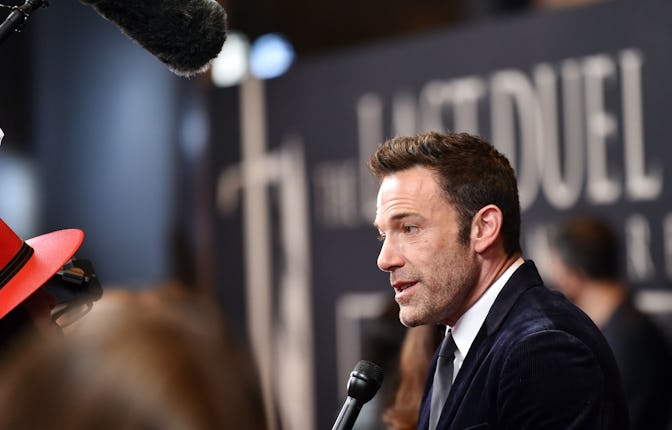Ben Affleck knows he has a second chance — with J. Lo and at life
In a new interview, the actor spoke candidly about addiction, his father, and his renewed romance with Lopez.

Ben Affleck knows a thing or two about second chances. A new interview with the actor is largely centered around the idea of using second chances to learn and grow from what he describes as a great deal of pain and shame — whether for himself, for his own father, or, of course, in regards to his relationship with Jennifer Lopez.
“Life is difficult, and we are always failing and hopefully learning from those failures,” he said. “The one thing you really need to avail yourself of the opportunities provided from that growth is the second chance. I’ve definitely tried to take advantage of that.” In the case of his second chance with J. Lo, his former fiancee who he began dating again earlier this year, that means knowing how to keep his mouth shut and protect a relationship that was once, partially by his own doing, the number one target for paparazzi fodder.
"You can write conjecture about it, but one of the harder lessons that I have learned is that it’s not wise to share everything with the world,” he said. “There are some things which are private and intimate and have meaning in terms of their intimacy by dint of the fact that they’re not shared with the rest of the world. I’m more comfortable just learning to find a boundary between things that I want to share and things that I don’t.” As for how he and Lopez got together again, he said to “imagine the best story, and I’m sure that’s the true version."
The most candid moments from the interview, though, revolved around what Affleck learned from addiction and his relationship with his father, a semi-absent alcoholic who is now sober — two subjects that seem intertwined in shaping his now more clear-eyed understanding of life, along with his new movie, The Tender Bar. In the film, directed by George Clooney, Affleck plays Uncle Charlie, a bartender who becomes a sort of father figure to a young man whose own dad is absent.
“As I was moving into adulthood as an adolescent, I remember casting around for an example, and the helplessness and the fear that come with not having something to hold on to, by way of example,” he said. “So you trial-and-error your way towards manhood. You need a father for positive reinforcement. I got that from my father — and missed it when he wasn’t there. In some ways I was able to see both sides: growing up with — and without — a father.”
That relationship also led to unfair assumptions on his own part against his father (also a writer who never found success but who Affleck expresses deep admiration for), including a remarkable story he shared about Dustin Hoffman:
“When I was a boy, my father would tell stories about being an assistant director at the Theater Company of Boston and about him and ‘Dusty.’ And I remember thinking, This is tragic, he’s bullshitting. He’s building this horrible fantasy about having had movie star friends. And I internalized a kind of shame that you carry when you feel ashamed of your dad. I carried it for a long time, until I was 25, and I went to the Oscars. That night, Dustin Hoffman came up to me and said, Is your father named Tim? I said yes. He said, Your father and I lived together. And I had this massive sense of embarrassment that I had misjudged my father.”
Yet Affleck, who has spoken publicly before about being a recovering alcoholic, understands acutely what plagued his father and often took him out of his childhood. “Oftentimes they want to sell you: Do your 30 days, and it’ll be fixed. The only real cure for alcoholism is suffering. You just hope that your threshold for suffering is met somewhere before it destroys your life,” he said. In his own journey toward sobriety, Affleck noted, “I didn’t get any stronger or develop any willpower. I simply met that threshold. You know, somewhere in the amygdala it said, This is too painful. I’m not going to do this anymore. I don’t want to do it. It was a moment after which it became clear that this was not the life I wanted.”
His life in recovery, it seems, has led to a new understanding and appreciation for accepting his flaws and growing from them: “My life now reflects not just the person that I want to be, but the person that I really feel like I am — which is not perfect, but somebody who tries very hard and cares very much about being honest and authentic and accountable.” Just don’t expect any details on how it’s all played into his return to J. Lo: “It’s a great story. And, you know, maybe one day I’ll tell it. I’ll write it all out. [Pauses] And then I’ll light it on fire. [Laughs]”